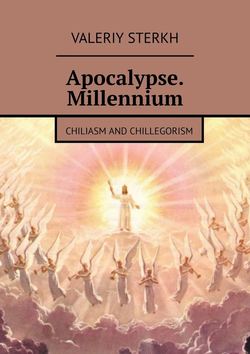Читать книгу Apocalypse. Millennium. Chiliasm and Chillegorism - Valeriy Sterkh - Страница 4
Section 2. Background
ОглавлениеPremillenarism as a doctrine was developed after the wide dissemination of the book of Revelation (The Apocalypse) which talks about the future millennial reign of the righteous. This doctrine can also be found in other canonical books of the Bible, though in a less clear way (See Section 6a).
In early Christian sources, Premillenarism appears as ideas about a separate resurrection of the saints (Didache, St. Clement of Rome, St. Ignatius the God-Bearer, St. Polycarp of Smyrna), a thousand-year Sabbath or a time of peace for the righteous (St. Barnabas, St. Justin the Philosopher and Martyr), the transformation of nature that happens in this time (St. Barnabas, St. Papias of Hierapolis). A highly detailed exposition of the patristic version of Premillenarism is found in «Against Heresies» by St. Irenaeus of Lyons.
Premillenarism was also supported by the Apostle Hermas, Clement of Alexandria, bishop Nepos of Egypt, Tertullian, St. Hippolytus of Rome, Commodian of Gaza, St. Victorinus of Petava, St. Athanasius the Great, St. Methodius of Patara and Olympus, Lucius Lactantius, St. Sulpicius Severus (presumably), St. Aurelius Augustine of Hippo (in his early works, later he leaned towards Chillegorism).
Premillenarism was opposed by the heresy of Hymenaeus and Alexander Philetus (who interpreted the resurrection allegorically [2 Tim 2: 16—18; 1 Tim 1:18—20]) as well as by the heresy of the Ebionites (Judeochiliasm), the heresy of Marcion (who taught about the resurrection of souls), the heresy of the Alogi (who rejected the books of the Apostle John), the heresy of Origen (taught about pre-existence and evolution of souls), the heresy of Marcellus of Ancyra (one of the founders of Premillenarism), the heresy of Apollinaris of Laodicea (opposed by St. Basil the Great, St. Gregory the Theologian, St. Epiphanius of Cyprus who accused him of Judeochilasm).
The above-mentioned heresy of the Alogi even influenced the books which were included in the canon of the Holy Scriptures – some Christians, following their deception, even questioned the apostolic origins of the Apocalypse (Gaius of Rome, St. Dionysius of Alexandria, Eusebius Pamphilius of Caesarea), and as a result, the book of Revelation became part of the canon with much delay.
Over time, the heresies of Hymenaeus and Alexander Philetus and the heresy of Marcion were transformed into Chillegorism of the Alexandrian school (probably under the influence of Origen). This tendency was severely criticized by the bishop Nepos of Egypt in his book «Refutation of the Allegorists» [«Denunciation of the Lovers of Allegory»]. However, this new teaching found favor with those who had rejected the apostolic origins of the Apocalypse, namely Gaius of Rome, St. Dionysius of Alexandria, Eusebius Pamphilus of Caesarea.
From the 4th century on, when Christians were no longer persecuted in the Roman Empire, the teachings of Gaius of Rome on the «restraining of Satan» (Rev 20:2) became popular among some theologians. This is when Chillegorism took its final form. The following people took an active part in this process: Ephrem the Syrian, St. Philastrius of Brescia, Tychonius Africanus, St. Jerome of Stridon, St. Aurelius Augustine of Hippo, Theodoret of Cyprus. Later, Chillegorism made its way into the widespread «Interpretation of the Apocalypse» by Andreas of Caesarea, which further popularized this teaching.
In the Russian Orthodox theology, Chillegorism was popularized by the metropolitan Macarius Bulgakov in his textbook «The Dogmatic Teaching of the Orthodox Church». This textbook (more precisely, the Chillegorism it taught) was harshly and most vehemently criticized by the priest Boris Kiryanov in his book «The Complete Explanation of the Earthly Millennial Kingdom of our Lord».
